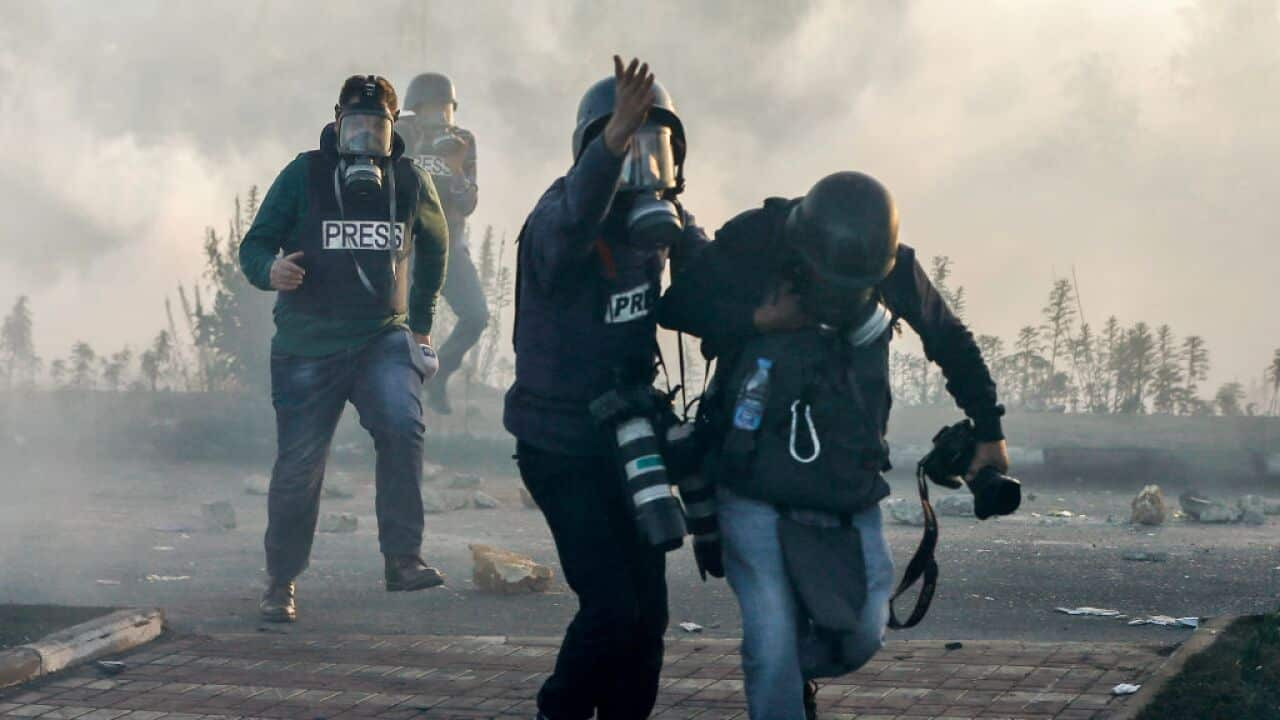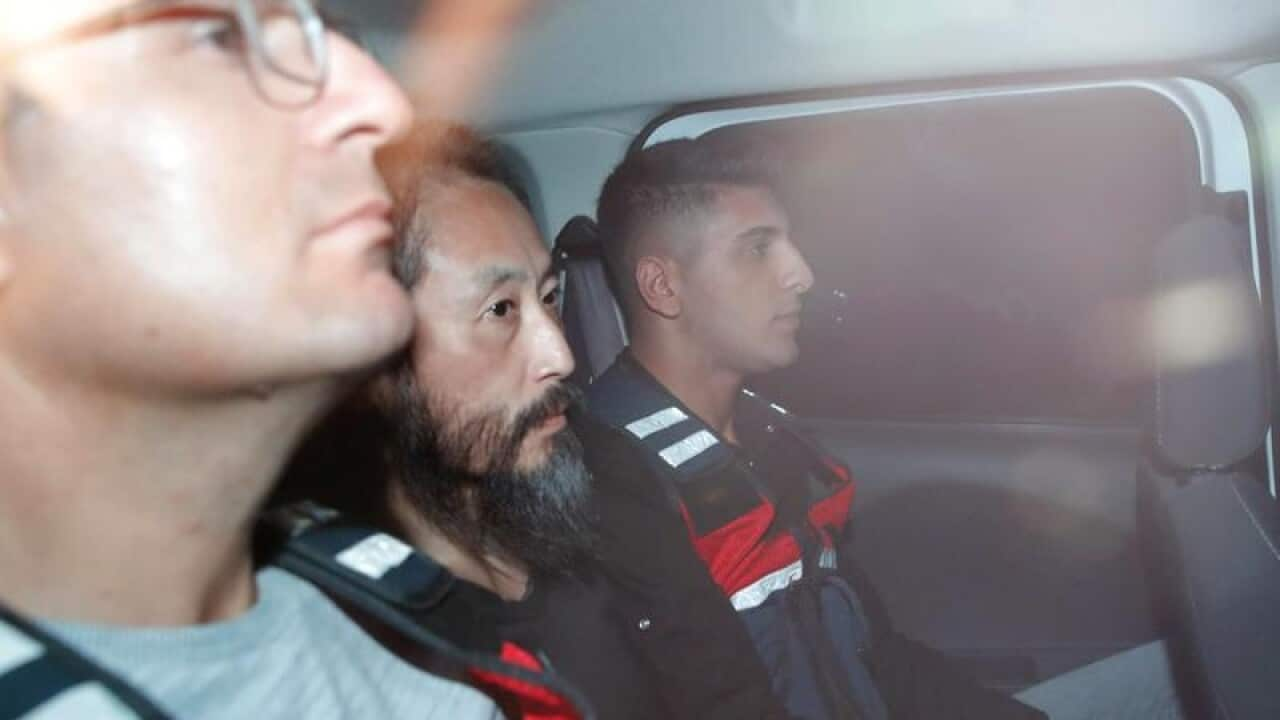More than a thousand journalists have been killed on the job in the past 12 years, according to the United Nations organisation UNESCO as it marks.
The International Federation for Journalists says, when other media workers besides journalists are included, the number of killings jumps to around 2000.
Jane Worthington, the federation's Asia Pacific acting director, said the initiative to set aside a day to mark their deaths was an important reminder of the issues journalists face.
"The International Day to End Impunity has come (about) ... it was created in response to a growing concern, growing numbers of journalists being targeted around the world, and the fact that justice was so rarely secured," Ms Worthington told SBS News.
Impunity
Nine of every 10 such killings go unpunished.
This year alone, the International Federation for Journalists reports .
The recent death of Saudi Arabian journalist and critic Jamal Khashoggi, killed in the Saudi consulate in Istanbul, Turkey, has captured global attention.
Saudi Arabia has admitted his killing was premeditated, but questions still remain about exactly who in government circles was involved.
His death highlights just some of the dangers faced by people reporting the news around the world. Paul Murphy, chief of journalists' union Media, Entertainment and Arts Alliance, said that case, along with many others, shows why the current negative rhetoric surrounding the media and journalism is dangerous.
Paul Murphy, chief of journalists' union Media, Entertainment and Arts Alliance, said that case, along with many others, shows why the current negative rhetoric surrounding the media and journalism is dangerous.

Activists hold a candlelight vigil for Saudi journalist Jamal Khashoggi. Source: AAP
"Given we're living in a time where journalists are under more attack than ever, really, inspired by everyone from Donald Trump down the line with these ridiculous phrases that are being thrown about, words do have consequences," Mr Murphy told SBS News.
"Journalists get targeted as a result of that sort of rhetoric, and you combine that with the complete failure to properly investigate these killings, it's just a disastrous situation."
The deadliest countries for journalists this year have been Afghanistan, Syria, Yemen and Mexico.
Ms Worthington said the death of any journalist or media worker should be a cause for concern.
"It's evidence that something in that community and that society is broken. When journalists get killed, it's one of the first signals of alarm that you should recognise that there's something gone wrong in a country," she said.
Australian impunity
Australia has , with all but one of the cases involving a journalist working in a foreign conflict zone.
The exception was Juanita Nielsen, a Sydney journalist and editor, who disappeared on July the 4th, 1975. Ms Nielsen was the owner and publisher of NOW magazine and had strongly advocated against development issues around Sydney's exclusive Potts Point.
Ms Nielsen was the owner and publisher of NOW magazine and had strongly advocated against development issues around Sydney's exclusive Potts Point.

Juanita Nielsen. Source: Supplied
The case remains unsolved despite considerable attempts to find her body and bring homicide charges against her murderers.
Another much-publicised case involved the so-called Balibo Five. Indonesian forces murdered journalists Brian Peters, Malcolm Rennie, Tony Stewart, Gary Cunningham and Greg Shackleton in Balibo, East Timor, on October the 16th, 1975.
Indonesian forces murdered journalists Brian Peters, Malcolm Rennie, Tony Stewart, Gary Cunningham and Greg Shackleton in Balibo, East Timor, on October the 16th, 1975.

The Balibo Five, from left to right - Gary Cunningham, Brian Peters, Malcolm Rennie, Greg Shackleton, Tony Stewart. Source: Supplied
Mr Murphy said the case may have been a lower priority for the Australian Federal Police for a reason.
"They admitted that they had not sought any cooperation from Indonesia, nor had they had any interactions with the Indonesian national police," Mr Murphy said.
"Now, how you conduct a proper investigation without doing that, quite frankly, is beyond me. We can only suspect that there are some international politics and sensitivities at play."
Consequences
Beyond those killed, UNESCO reports thousands more journalists around the world have been attacked, harassed, detained or imprisoned on spurious charges, without due process. Mr Murphy said impunity is incredibly dangerous, not only for journalists but for the general public.
Mr Murphy said impunity is incredibly dangerous, not only for journalists but for the general public.

A Palestinian medic aids a journalist during clashes in Gaza. Source: Getty Images
"It sends a message that journalists can be targeted and, if you kill a journalist, you've got a 90 per cent chance of getting away with it scot-free, which is absolutely appalling."
While Australia has a good record in regard to physical safety for journalists, it does face issues with press freedom.
There are concerns about moves towards criminalising journalism and targeting whistleblowers.
"The situation in Australia for journalists is often difficult, in terms of getting access to information and a range of other restrictions imposed by the government, defamation proceedings and so on, but we are in a relatively fortunate situation in Australia, particularly compared to other parts of our region," Mr Murphy said.
Taking action
The IFJ's Jane Worthington said change to protect journalists needs to occur at an institutional level.
"The government has to be a driving force in ending impunity," Ms Worthington said.
"They have to bring the perpetrators to account. They're the ones driving this. I mean, you can have all the global bodies and UNESCO putting pressure on governments, but, ultimately, it comes down to the government to bring that change, you know. And so this is what this day is all about."



